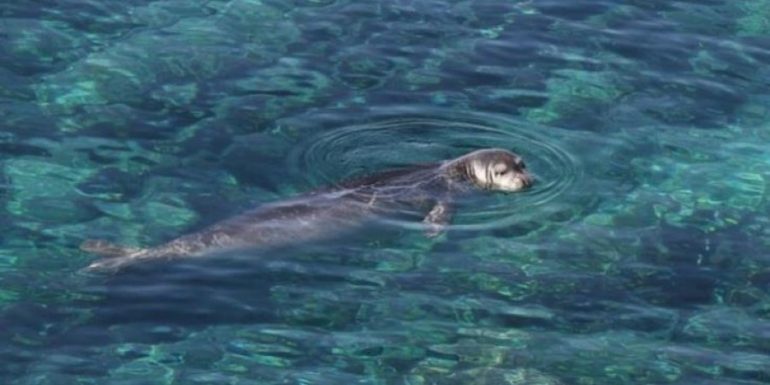A total of 4 - 5 Monks - Monks Mediterranean seals were found in the last days in the area of Ayia Napa, while their number throughout Cyprus reaches 19. In statements to KYPE, the Officer of the Fisheries Department Melina Markou appeals to the citizens not to disturb them during this critical period of their reproduction.
In her statements to KYPE, Ms. Markou stated that "this period is very important for the Monk-Monk seal since it is the season that reproduces, but it needs silence. "It is important that citizens do not go to the area where the seals are located and do not disturb them," he said, noting that "recently it has been observed that several people go to the rocks or dive into the sea to take videos and photos."
He added that "because the seal wants isolation to give birth, in case it is bothered daily, it will not feel comfortable and will leave the area. The seal needs some preparation to give birth to its young and is looking to find the right cave and in case there is daily annoyance from humans, then it will leave the area or give birth in an unsuitable cave ".
According to Ms. Markou, "when seal babies are born, they do not know how to swim and depend exclusively on their mother both for their food, since they are breastfeeding, and for their safety. In case the seal gives birth in an unsuitable cave, if there is bad weather, the baby will drown ".
Also "in case the man is constantly bothering the seal, she will abandon her baby as a result of which she will die of starvation or leave the cave when she will either drown or die of starvation. "Man must protect the Monk-Monk seal at this critical time, leaving her to give birth quietly and raise her babies."
Answering a relevant question, Ms. Markou said that "since 2011 we have noticed that the Mediterranean seal reproduces almost annually. "If we want to maintain this situation, then man must respect the space that the seal chooses to give birth to its young."
We understand, he continued that "people have shown great enthusiasm with the presence of this seal in the waters of various areas of Cyprus, but it is important to respect this critical period of reproduction."
To another question he answered that "there are several causes which bother the seal and endanger its safety. "Among them is to catch newborn babies in fishermen's nets, something that fortunately does not exist until today in Cyprus but is observed in Greece."
That is why "we asked for the help, assistance and contribution of fishermen, a large percentage of whom are quite aware and several times had notified the Department of Fisheries about the presence of seals in certain areas. The contribution of fishermen who are constantly in the seas, is considered particularly important for the protection of the species Monks - Monks ".
Asked whether it is a rare phenomenon to locate this seal in the sea area of Ayia Napa, Ms. Markou answered that "the Department of Fisheries has placed cameras in the caves of the area especially in winter and it was observed that the seal uses the caves regularly time lapses".
"The fact that we have not had a breeding season in the Ayia Napa area so far does not mean that there will not be, it is enough for humans to leave the seals alone," he said.
He added that "humans are the main reason why seals have not used the caves in the Ayia Napa area for breeding until today. The specific caves are very good to be used by the seals and until today 4-5 seals have been identified entering and leaving the caves ".
Specifically, "there are two large female seals, one male and two younger in age and we see from the cameras that they use the specific caves. The seals are moving all over Cyprus and we observe that today they can be in Ayia Napa and in a few days they can be located in Akamas ".
He also said that "a total of about 19 Mediterranean monk seals have been identified in Cyprus and use caves in areas that are protected either as Natura or as protected marine areas."
Source: KYPE
